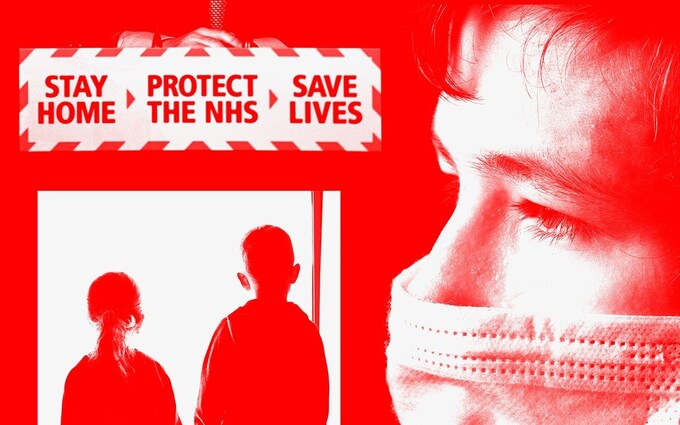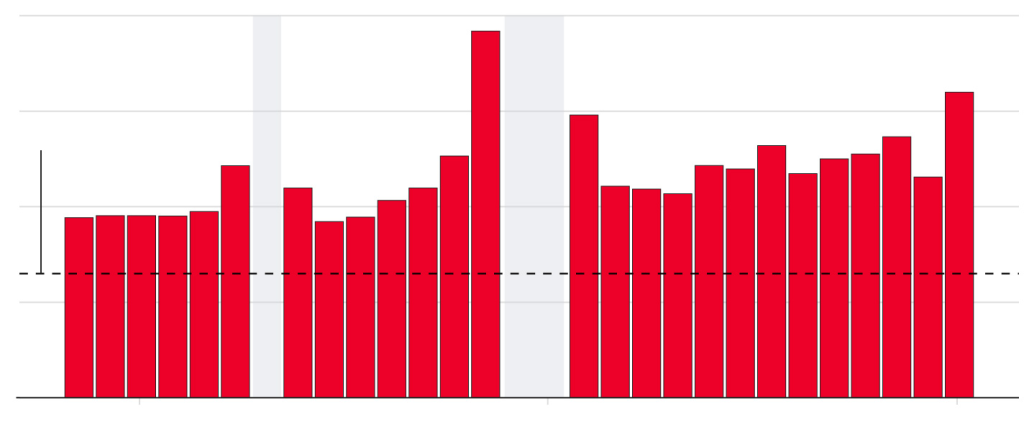New research has shown that lockdowns fuelled a staggering rise in teenage eating disorders – and this was not the only damage done
ByJoanna Williams 22 June 2023 • 8:15pm

Every day new evidence emerges of the harms of lockdown on children. Researchers find rising numbers of those with eating disorders and social anxiety, or who are self-harming and dropping out of school. And that’s far from an exhaustive list.
The fact our young suffered the effects of lockdown in many more ways than we could ever have predicted has left parents, schools and the healthcare system reeling in the virus’s wake. But today, little is being done.
Over the pandemic’s course, the number of youngsters seeking help for mental health problems soared, jumping from an estimated 12.1 per cent of children in 2017 to 17.8 per cent in 2022. The youngest children – those aged between seven and 10 – saw the biggest increase. But adolescent mental health issues have also become more prevalent, with new research this week showing that lockdowns fuelled a staggering 42 per cent rise in eating disorders among teenagers – the sharpest rise being in girls aged between 13 and 16 – and led to a similar increase in incidents of self-harm.
The lead author of the latest study suggests that social isolation, anxiety, disruption in education and over exposure to negative social media influences left many children feeling they had lost control over their lives, and that this could have contributed to the development of eating disorders. Hospital admissions because of eating disorders had their sharpest annual increase in the year after the pandemic, rising from 5,950 among under-18s to 7,767.

School closures had a devastating impact on education. Pupils starting in reception in 2019 spent, on average, 85 days out of class. Some, especially those placed in “bubbles” where entire year groups were sent home if just one pupil tested positive, missed far more. As a result, the proportion of pupils meeting literacy and numeracy benchmarks at the end of primary school fell from 65 per cent in 2018-19 to 59 per cent in 2021-22.
Some children suffered far more from school closures than others. While some received a full timetable of interactive online lessons, many did not.
The difference in performance between those from disadvantaged backgrounds and their better-off classmates widened significantly between 2020 and 2022 – reversing a trend that had seen the educational attainment gap between rich and poor shrink over the previous decade.

Once schools reopened, many thousands of children failed to turn up. Last year, pupil absences stood at double pre-pandemic levels, with around 1.5 million children missing over 10 per cent of timetabled classes. The number of severely absent children has risen by more than 50 per cent in a year. Truancy is far higher in more socially deprived communities.
Despite this damning weight of evidence, the national Covid inquiry has – so far – shown little interest in acknowledging lockdown’s impact on children. Or interrogating why this situation was allowed to occur.
The week former chancellor George Osborne revealed what was really at stake with scattergun lockdown policies when he gave evidence at the inquiry earlier this week. Governments have to weigh “life expectancy” against sacrificing “the educational opportunities of an eight-year-old” he declared. While we are yet to learn exactly how the “weighing up” took place, the conclusion of such deliberations has long been clear.

Protecting the elderly won out over preserving the opportunities and freedoms enjoyed by the young. The average age of coronavirus fatalities was 82.4 years while people dying from other causes in the same period lived to be 81.5 years. Meanwhile, children were kept at home as schools, youth clubs, sports teams, music lessons and even playgrounds closed down.
In a complete reversal of the normal social contract, children were expected to make life-changing sacrifices to protect adults.
Why? The readiness to see children and adults as equals and, when it came to Covid, “all in it together”, was set in place long before the pandemic. Over recent decades, the once distinctive categories of “childhood” and “adulthood” became blurred.
While my 17-year-old daughter was stopped from buying a pen knife for her Duke of Edinburgh award camping trip, if we lived in Scotland or Wales she’d be voting in elections. Adults seem uncertain whether they are to protect children or be led by them.

These collapsing boundaries are not the result of children marching for suffrage or demanding more rights. Rather, they stem from adults rejecting the moral authority that once came with maturity and failing to assume responsibility for a younger generation.
In this context, it should not surprise us that, during lockdown, children were expected to make sacrifices to protect adults. Policymakers knew from the start that this virus disproportionately targeted the elderly and clinically vulnerable. But telling teenagers “Don’t Kill Granny” placed responsibility directly on their young shoulders.
Living their lives through a screen, they believed, would help save much-loved relatives. It is hard to think of a clearer instance of adults abdicating responsibility.
Briefly, post-lockdown, there was talk of summer camps and catch-up classes to compensate children for their missed opportunities. Few ever materialised. Instead, we have yet more school trips and sports days missed because of striking teachers – prioritising their own needs. University students who spent their first year studying entirely online now graduating without degrees because striking lecturers refuse to grade work.
A final symbol of our warped priorities towards children is how little their concerns feature in the national Covid inquiry. As things stand, the education secretary responsible for closing schools, Gavin Williamson, has not even been called to submit evidence. Children deserve far better.
‘It was a perfect storm for self harming and eating disorders’
Emily Samuel, child psychotherapist from Bath
Since 2021 I have seen a surge in parents seeking psychological support for their children. On average, I receive three daily inquiries. Young people roughly fall into two camps. Those who were already vulnerable and struggling, for whom lockdown pushed them over the edge. For them, school was often the one safe and consistent space.
Then there are those who found the months of lockdown very disruptive. Perhaps they came at just the wrong time for them, perhaps home was a difficult place during the pandemic, perhaps they have found going back into the world traumatic in some way. For many of my patients who are on the autistic spectrum, they have never really gone back to school full time. It has become too overwhelming for them to be there.
It was also really hard for those children who were moving up from primary to secondary and never got that normal smooth transition. They didn’t have their normal routine, they weren’t being exposed to other children and the usual ups and downs of daily life. It has made school a source of anxiety and instability, rather than what it should be, which is a constant in a young life, and a source of friendship and confidence building.
I’ve also seen a rise in children and teenagers presenting with eating disorders. Often an eating disorder can be a reaction to an out-of-control event or a period when you have felt a sense of powerlessness and lockdown was a perfect storm in that sense. It was an unstructured time (however hard parents tried with homeschooling) and it’s likely that for many children there was a great deal of stress in the home.
I’ve also seen a surge in self-harm. It’s often a response to feeling overwhelmed, which I think is common among a lot of young people are experiencing. Parents are understandably terrified. Seeing your child so low that they are self-harming or talking about suicide is extremely scary. Nothing equips you for that as a parent, and there simply aren’t enough resources out there to help mums and dads cope with the immense pressure of caring for a child who is struggling.
During Covid, it was easier to slip through the cracks of Child and Adolescent Mental Health Services, which could have helped with an early intervention. If parents didn’t have access to those services, they may have found their child got worse very quickly. By now, things could be at a very scary stage.
‘They don’t have friendship skills – or empathy’
An anonymous year four teacher at a mixed independent primary school
For my class of year fours, this is their first experience of a normal year at school. Until now, their entire education has been marred by lockdowns and restrictions. This year should have been a chance to finally get them back on track. Instead, I have found for the past few months it has been a case of realising all the many subtle ways they are behind.
Their love of learning has been badly affected. They are very unengaged in lessons and it has been difficult to get them excited about things. This is a group of eight and nine-year-olds who should be fizzing with energy, but they seem worryingly flat.
They are also completely addicted to screens. Parents had to work during lockdown so understandably put them in front of screens earlier than they might have. Now, even with children as young as eight, we are dealing with endless online issues like bullying on Minecraft Chat.
Attendance has plummeted as school ceases to be a priority for lots of families. At my school, we often have parents informing us their child won’t be coming in for the next month because they are taking a trip to see family they weren’t able to visit during Covid. It usually comes with an expectation that we will set work for that child – a sense of “well you did it in lockdown, can’t you do it again?” One parent asked me recently if I could just set up a webcam at the back of the classroom. I’m not sure what they thought their child would get in the way of an education from that.
There is a lot of tension between parents and schools at the moment. I think parents lack trust in schools after those months when they were so disconnected from their children’s education. There were periods when the kids had gone back but parents weren’t allowed in the building. They might not even have ever seen their child’s classroom. It means that now they intervene all the time, over things they might previously have dealt with privately. I get constant emails from parents instructing me to resolve a simple playground dispute.
In class, the children’s interpersonal relationships are seriously lacking. The way they relate to each other, their empathy – it’s more akin to how year ones behave. They don’t have friendship building skills. It’s no wonder when you think that for a long time they didn’t do playdates, and at school were separated on their desks. They weren’t even sharing pencil cases, everyone had their own little pencil and weren’t allowed to swap. So even things like asking someone to pass the pencil pot on the desk now descends into chaos.
Recently, one child turned to another after he’d finished his work and said “you’re an idiot because you’re not finished yet”. I wouldn’t expect with a nine-year-old to have to sit them down and say “how do you think that made that person feel?”
‘We all feel isolated and disconnected’
An anonymous first year university student
I was 16 when the pandemic hit. At the time it felt like the worst possible moment for school to be disrupted. I can remember feeling very scared about what would happen with our GCSEs. Would we be able to sit them or would they be cancelled? Would I get into college? And what about university after that? I just remember feeling so anxious and there seeming to be no information about what was going to happen.
When we heard they were going to use our predicted grades I was worried as I knew I could get a better mark in my maths and would need a good maths grade to get into uni. They ended up being just good enough to get in, though I now know that with a slightly higher mark in maths I could have been accepted onto the course I wanted to do, at the university I wanted to go to. I’m at Liverpool studying business management, but I really wanted to do computer science at Leeds. With a different maths GCSE I would have got in, so as I see it Covid didn’t only affect my GCSEs, it affected my university experience too.
The next lockdown came just as we were starting our A-levels and everything switched back to remote learning again. One of my courses was design technology and we couldn’t do most of it because we couldn’t get into the workshop. Remote learning made everything take longer. They cut down on some of the topics that there wasn’t time to finish, but it was really tough.
It’s had a lasting effect too. I find it very difficult to focus on work, especially as much of my university course seems to involve remote working too. Lots of the lectures just happen online so it’s hard to motivate yourself to attend them. It’s hard to get in touch with the professors and you feel quite removed from them. Sometimes you never even meet, you just speak to them on email.
Broadly speaking I’m happy at Liverpool and I’m lucky that the pandemic didn’t leave me struggling too much mentally, as I know it did for a lot of people. But I wish we could change this way of working that we fell into during lockdown. It’s leaving too many students like me feeling isolated and disconnected to their studies.
https://www.telegraph.co.uk/news/2023/06/22/children-lockdown-sacrifices-paying-price/
_______________________________
The Time for Silence is Over
A unified pushback against the globalist agenda
It’s finally here, the Global Walkout begins September 4th at 8pm London time and continue every weeks. Next step 2nd of July 2023.
One step at a time, hand in hand, we are walking out from the globalist society they are trying to enslave us into
ANYONE can participate
ANYWHERE in the world
JOIN or read about it here – https://globalwalkout.com

https://www.reignitefreedom.com/
The third step is to unsubscribe from all mainstream media outlets. Delete the apps from your phone, laptop, and tablet and unfollow all of their social media and YouTube channels. Try to avoid mainstream media for at least one week, even if the headline is intriguing.
In the same time why not removing all the big tech tracking/spying/social credit system around you: (Youtube, Facebook, Instagram, Twitter, Tik Tok, Google, Apple, Microsoft, Whatsapp, Zoom, Linkedln, Snapchat, Tumblr, Pinterest, Reddit, Myspace, etc.)
The fourth step of the global walkout is to move as many accounts as you can to a union or local bank.
If you like our work please consider to donate :
_______________________________
If you are looking for solutions (lawyer, form, gathering, action, antidote, treatments, maybe this could help you:
HERE
If you want to fight back better:
https://childrenshealthdefense.org/child-health-topics/health-freedom/defender-days-sticker-gallery/
Find the others: www.freedomcells.org
Spike Protein Protocol
Glutathione (most important for body detoxification) or better
NAC = N-Acetyl-Cysteine 600-750mg (causes the body to produce glutathione itself)
Zinc
Astaxantin 5mg (also improves vision)
Quercetin
vitamin D3
Milk thistle (also liver and stomach protection)
Melatonin 1mg to 10mg (against 5G)
Alternatively CDS/CDL and zeolite
Dr. Zelenko’s Protocol contains Ivermectin, Hydroxychloroquine (HCQ), Zinc, Vitamin D3, and Quercetin.
How to find the truth :
Search engine: https://presearch.org/, https://search.brave.com/, Searx (choose the server that you want) or https://metager.org/
Videos: www.odysee.com
www.bitchute.com
www.brandnewtube.com
Facebook style: www.gab.com or https://www.minds.com/
INTELLIGENCE ISN’T KNOWING EVERYTHING, IT’S THE ABILITY TO CHALLENGE EVERYTHING YOU KNOW
 RSS Feed
RSS Feed















 June 29th, 2023
June 29th, 2023  Awake Goy
Awake Goy  Posted in
Posted in  Tags:
Tags: 













